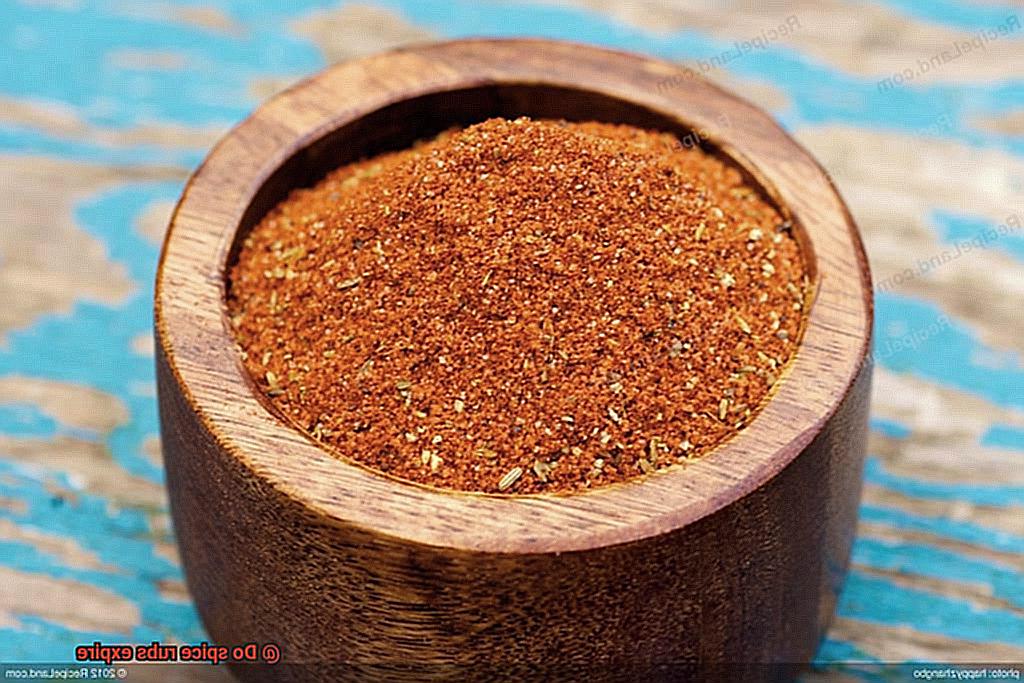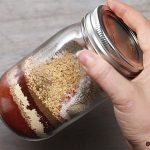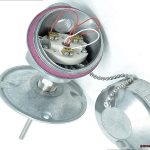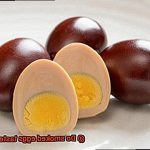Are you a culinary adventurer, always on the lookout for new spice rubs to tantalize your taste buds? If so, you’re likely familiar with the magic of spice rubs. They’re a quick and easy way to add a burst of flavor and color to your dishes, making them stand out from the crowd.
But what happens when your spice rubs have been sitting in your pantry for months? Do they expire like other food items, or can they last forever? As an expert in all things food-related, I’ve been asked this question countless times, and the answer is not as straightforward as you might think.
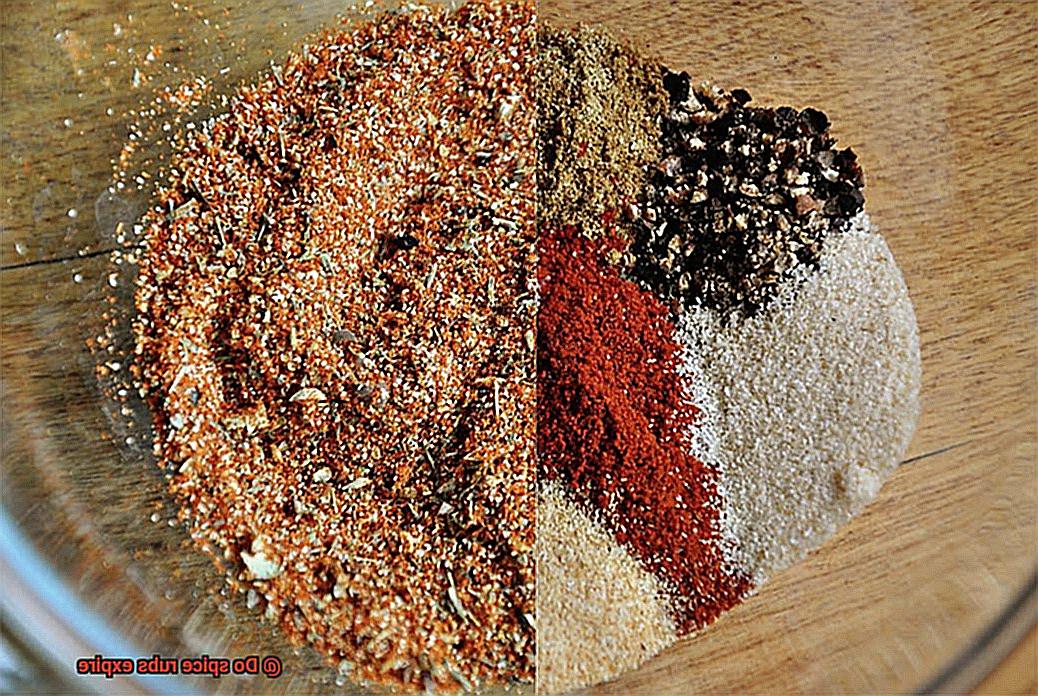
Several factors come into play when determining whether a spice rub has expired or not. The quality of ingredients used, how it’s stored, and the type of spices all play a role. In this blog post, we’ll explore these factors in detail and provide tips on how you can extend the shelf life of your favorite spice rubs.
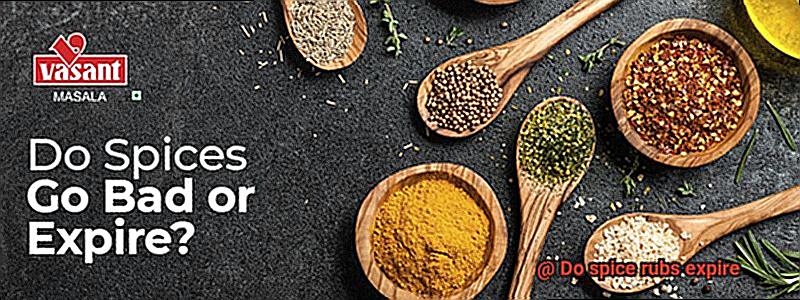
So, if you’re wondering whether it’s time to say goodbye to that jar of paprika or chili powder, keep reading. We’ll help you discover whether your spice rubs are still good to use or if it’s time to toss them out.
Contents
What are Spice Rubs?
Spice rubs are a magical concoction of aromatic herbs, flavorful spices, and other ingredients that can take your dishes to the next level. These mixtures are used to season meats, vegetables, fish, or anything else you want to add an extra punch of flavor to before cooking. Spice rubs are a great way to add depth and complexity to your dishes without adding extra fat, sugar, or salt.
The beauty of spice rubs is that they can be customized to suit different tastes and preferences. You can adjust the amount of each spice and herb used in the blend to achieve the perfect balance of flavors. Some common spices used in spice rubs include cumin, coriander, paprika, garlic powder, onion powder, chili powder, and black pepper. You can also add other herbs like thyme, rosemary, and oregano for extra flavor.
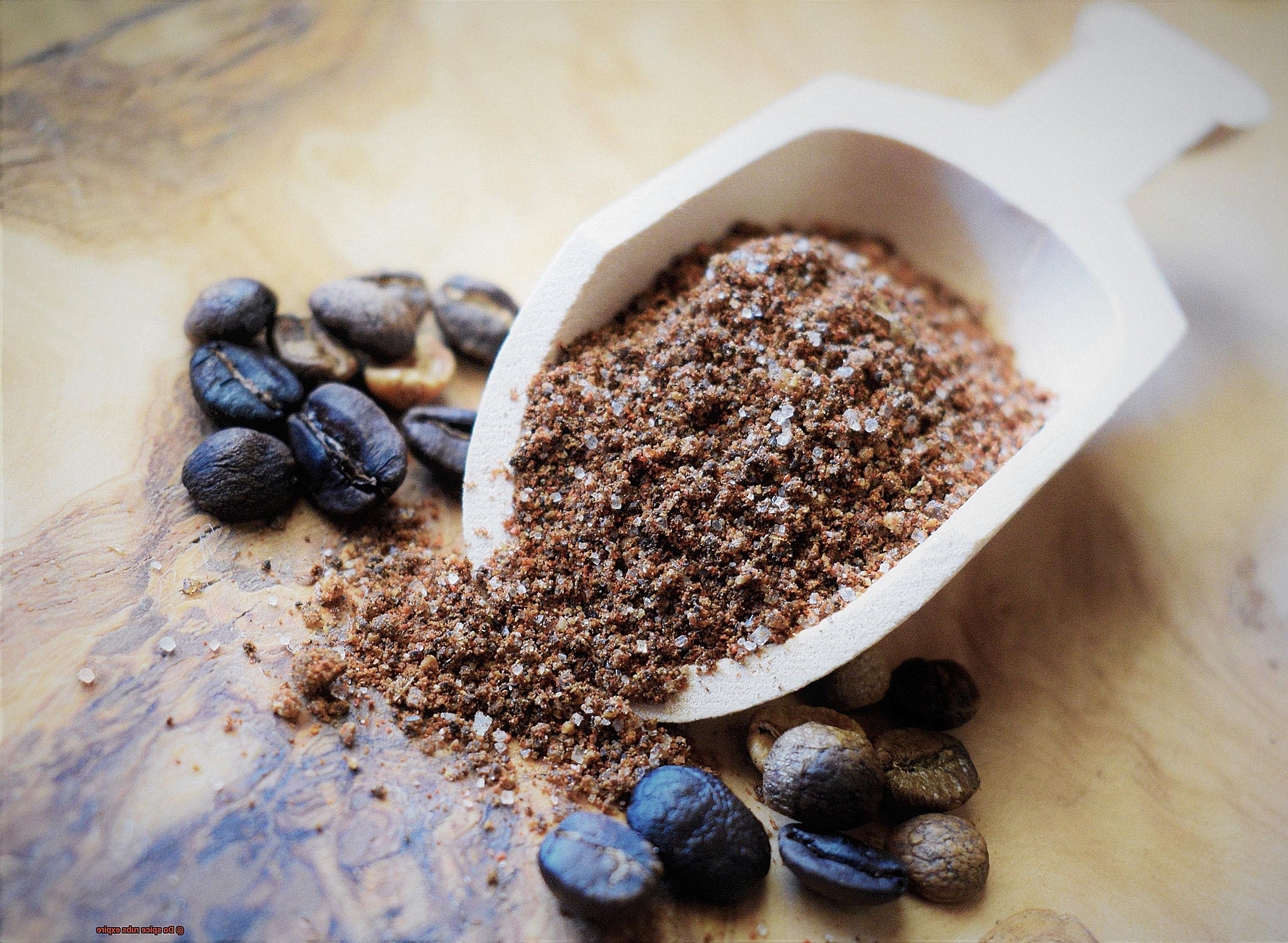
Spice rubs can be purchased pre-made at grocery stores or made at home using a variety of recipes available online or in cookbooks. Homemade spice rubs are easy to make and can be stored in an airtight container in a cool, dry place for up to six months.
When it comes to storing spice rubs, there are a few things you need to keep in mind. Firstly, the types of spices used can affect their shelf life. Ground spices tend to have a shorter shelf life than whole spices because they have more surface area exposed to air and moisture. Whole spices can last longer because they are less vulnerable to oxidation. Additionally, spice rubs should be kept in an airtight container in a cool, dry place away from direct sunlight and heat sources. Exposure to air, moisture, and light can cause spices to break down and lose their potency.
It’s also important to note that some spice rubs may contain salt or sugar as ingredients. These components act as preservatives that help extend the shelf life of the rub. However, it’s still essential to check the expiration date on the container and discard the rub if it has expired or smells off.
Do Spice Rubs Expire?
Well, here’s something you need to know: spice rubs expire. But don’t fret, we’re here to break down the reasons why and what factors affect their shelf life.
First off, the shelf life of spice rubs is determined by various factors such as ingredients used, packaging, storage conditions, and the presence of preservatives. Typically, most spice rubs have a lifespan of six months to a year. Though some may last longer if stored correctly, it’s still best to use them within their expiry date to ensure maximum flavor and effectiveness.
Now let’s talk about the primary factor that determines the shelf life of spice rubs: the ingredients used. Spices and herbs contain natural oils that can oxidize and spoil over time, leading to a loss of flavor and aroma. This is why using fresh ingredients when making your own spice rubs or purchasing recently ground ones is crucial.
Packaging and storage conditions also play a significant role in determining the shelf life of spice rubs. Exposure to air, light, and moisture can cause the spices to degrade quickly. To extend your spice rub’s longevity, store them in airtight containers in a cool and dry place away from direct sunlight or heat sources.
It’s worth noting that some commercial spice rubs may contain preservatives or anti-caking agents that can extend their shelf life. However, always check the label for any preservatives or additives that may affect the quality or safety of the product.
In summary, natural ingredients’ degradation and exposure to air, light, and moisture are the reasons why spice rubs expire over time. To keep your spice rubs at their best, use fresh ingredients when making your own spice rubs or purchase ones with a recently ground mixture. Proper storage in airtight containers in a cool and dry place away from direct sunlight or heat sources can also extend their shelf life.
Factors that Affect the Shelf Life of Spice Rubs
If you are, then you know that having fresh spice rubs is crucial to achieving that perfect taste. But do you know the factors that affect the shelf life of your spice rubs? Let’s dive into the science of spice rub preservation and explore some tips on how to keep them fresh.
The freshness and quality of the ingredients used in spice rubs play a significant role in determining their shelf life. Spices and herbs have varying levels of volatility, meaning they lose their flavor and aroma over time. Therefore, using fresh, high-quality ingredients when making spice rubs is essential for longer-lasting freshness.
The packaging of spice rubs also affects their lifespan. Loose containers or bags expose them to air and moisture, leading to spoilage. To preserve your spice rubs, store them in airtight glass jars with tight-fitting lids or vacuum-sealed bags, minimizing air exposure.
Storage conditions are crucial in keeping your spice rubs fresh. Heat, light, and moisture accelerate the breakdown of spices and herbs, leading to a shorter shelf life. Thus, store your spice rubs in a cool, dry place away from direct sunlight and humidity.
The frequency of usage is another factor that affects the shelf life of spice rubs. The more often you use them, the faster they expire due to exposure to air and moisture. To extend the life of your spice rubs, use only what you need and avoid exposing the rest to air.
Now that we’ve explored the factors affecting the shelf life of spice rubs let’s summarize our tips for keeping them fresh. Firstly, use fresh, high-quality ingredients when making them; secondly, store them in airtight containers or bags; thirdly, keep them in a cool, dry place away from direct sunlight and humidity; lastly, use only what you need and avoid exposing the rest to air.
Types of Spices Used for Spice Rubs
If you want to take your cooking game to the next level, you should definitely try using spice rubs. Spice rubs are a combination of ground spices and herbs that can add fantastic flavor and aroma to your meat, poultry, fish, and vegetables. There are several types of spices that can be used in spice rubs, and each one of them has unique flavors and aromas that can enhance the taste of your food. Let’s explore the different types of spices commonly used in spice rubs.
Paprika
This mild spice is made from dried peppers and adds a sweet and smoky flavor to the food. It is a popular ingredient in barbecue spice rubs and gives a bright red color to the meat.
Cumin
This warm and earthy spice is commonly used in Middle Eastern and Indian cuisine. It adds a nutty and slightly bitter flavor to the food and pairs well with meats like lamb and beef.
Chili Powder
This is a blend of ground chili peppers, cumin, garlic, oregano, and other spices that adds a spicy and smoky flavor to the food. It is commonly used in Tex-Mex cuisine.
Garlic
This pungent herb adds a strong flavor to the food and pairs well with meats like chicken and pork. Garlic is commonly used in Mediterranean cuisine.
Black Pepper
This versatile spice adds a pungent and slightly spicy flavor to the food. It is commonly used in spice rubs for beef, pork, and chicken.
Mustard Powder
Made from ground mustard seeds, this spice adds a pungent and slightly bitter flavor to the food. It pairs well with meats like pork and chicken.
Thyme
This herb has a subtle woody flavor that pairs well with meats like chicken and fish. It is commonly used in Mediterranean cuisine.
When creating spice rubs, it’s important to note that spices lose their potency over time. Using fresh spices and storing them properly in an airtight container away from light and heat will ensure that your spice rubs are as flavorful as possible.
Combining different types of spices can lead to unique and flavorful rubs that are perfect for grilling. For example, you can use paprika, cumin, and chili powder to make a Tex-Mex-inspired spice rub. On the other hand, you can use garlic, thyme, and black pepper to create a Mediterranean-style rub. Experimenting with different spice combinations can be fun and lead to delicious results.
Storing Spice Rubs Properly
As a foodie, you know that one of the best ways to add flavor and depth to your dishes is with spice rubs. But if you’re wondering how to store them properly to maintain their potency and flavor, I’m here to guide you through the dos and don’ts of storing spice rubs.
The most important rule of thumb is to store your spice rubs in airtight containers away from heat, light, and moisture. These elements can cause spices to lose their flavor over time. So keep them in a cool, dark place like a pantry or cupboard.
When it comes to container options, glass jars with tight-fitting lids are my favorite choice. They seal out air and moisture while allowing you to see the contents of the jar. Plus, they add a touch of elegance to your kitchen shelf. Alternatively, plastic bags with zip closures can be used for easy storage and labeling, just make sure they’re airtight.
It’s essential to remember that spice rubs have an expiration date. While they won’t spoil or become unsafe to eat, they will lose their flavor and potency over time. As a general rule of thumb, spice rubs should be used within 6-12 months of being made. Label them with the date they were made, and discard any past their expiration date.
The Role of Preservatives in Extending the Shelf Life of Spice Rubs
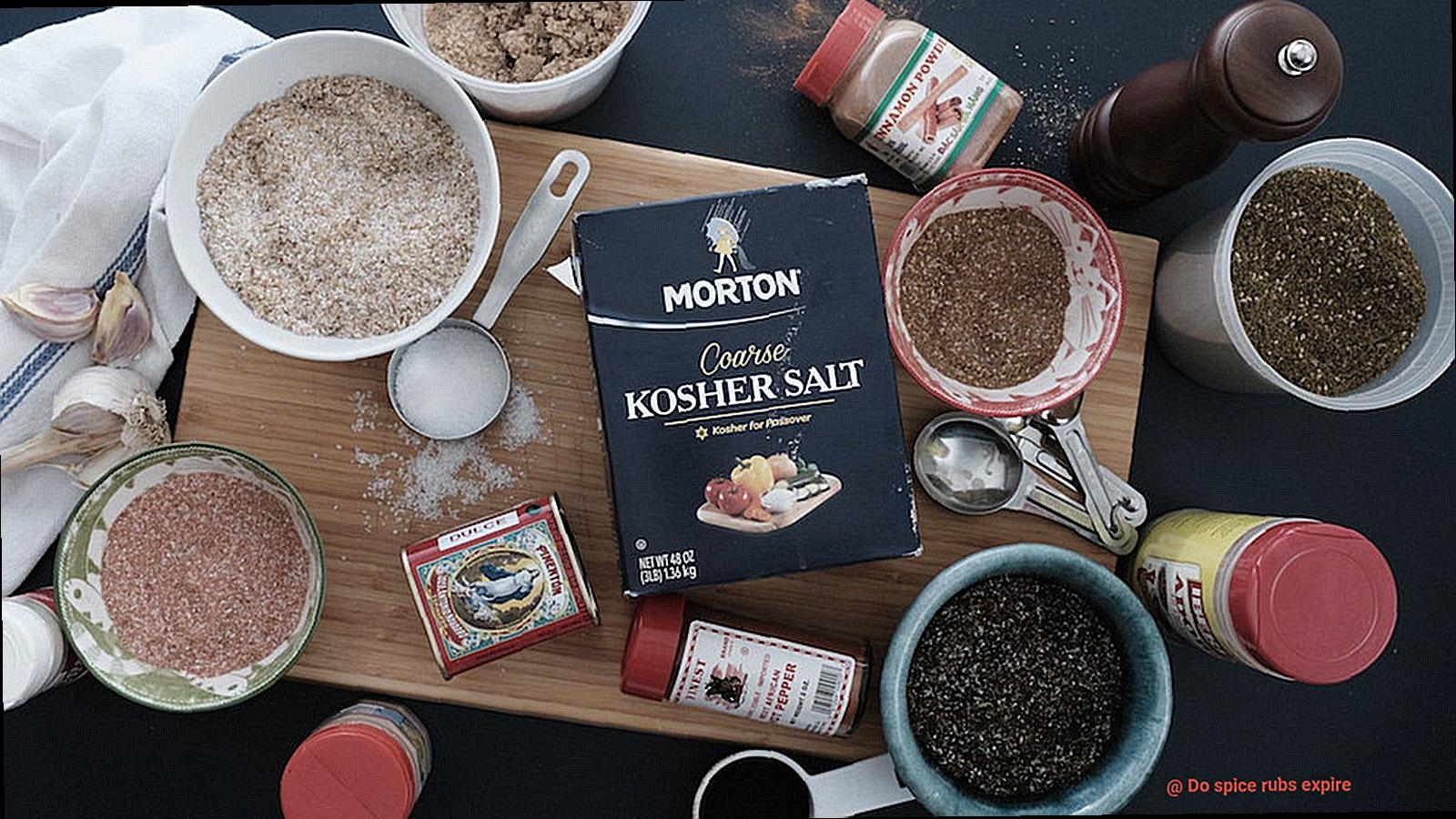
Then, you know how crucial it is to keep your spice blends fresh and delicious. But what makes them last longer? The answer is preservatives.
Preservatives are like superheroes for spice rubs, protecting them from spoilage and extending their shelf life. Salt is one of the most commonly used preservatives in spice rubs, thanks to its natural ability to draw out moisture from herbs and spices, making it difficult for bacteria to grow. Other preservatives like citric acid, vinegar, and ascorbic acid also work their magic to keep your spice rubs free from spoilage.
However, we understand that some consumers prefer to avoid preservatives in their food due to health concerns. In such cases, proper storage is essential to keep your spice rubs fresh without the need for preservatives. It’s best to store them in a cool, dry place away from direct sunlight and moisture.
Moreover, checking the expiration date on your spice rub packaging is equally important. Preservatives can extend the shelf life of spice rubs, but they still have a limited lifespan. Using expired spice rubs can result in a loss of flavor, potency, and even pose potential health risks.
How to Check if a Spice Rub Has Expired
Spice rubs are a grilling staple, but using an expired one can quickly ruin your meal’s flavor and even pose health hazards. As an expert in this field, I want to share the essential steps to check if your spice rub has expired.
Expiration Dates
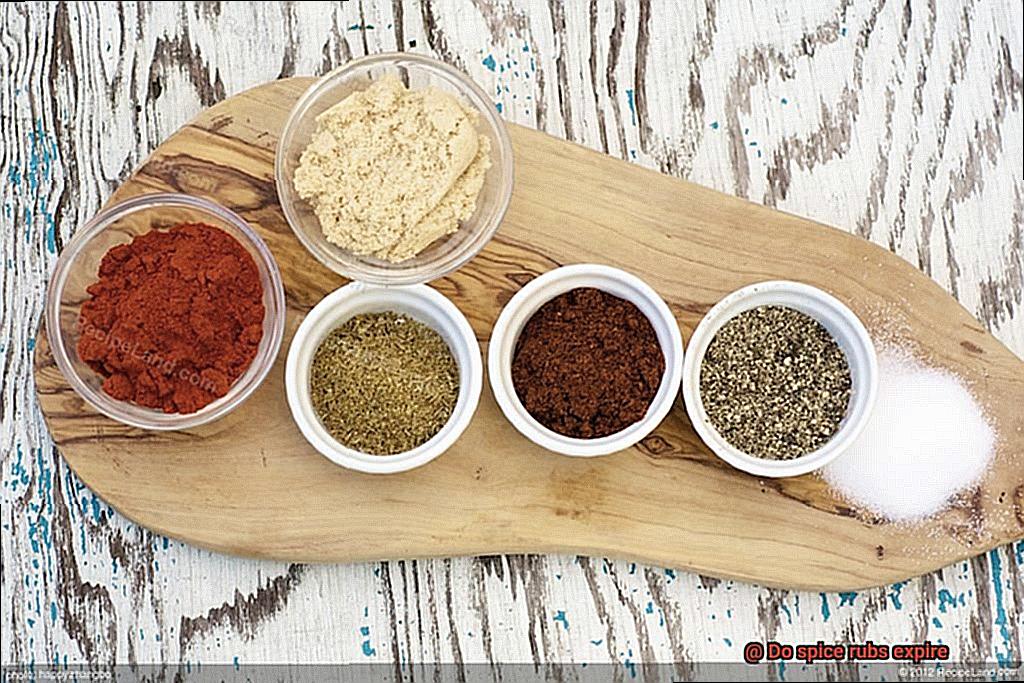
Always start by checking your container’s label for a “best by” or “use by” date. This date indicates how long the spice rub will maintain its flavor and potency. If it has passed, it’s time to discard the container. However, if there is no label date, you can still determine if it’s expired.
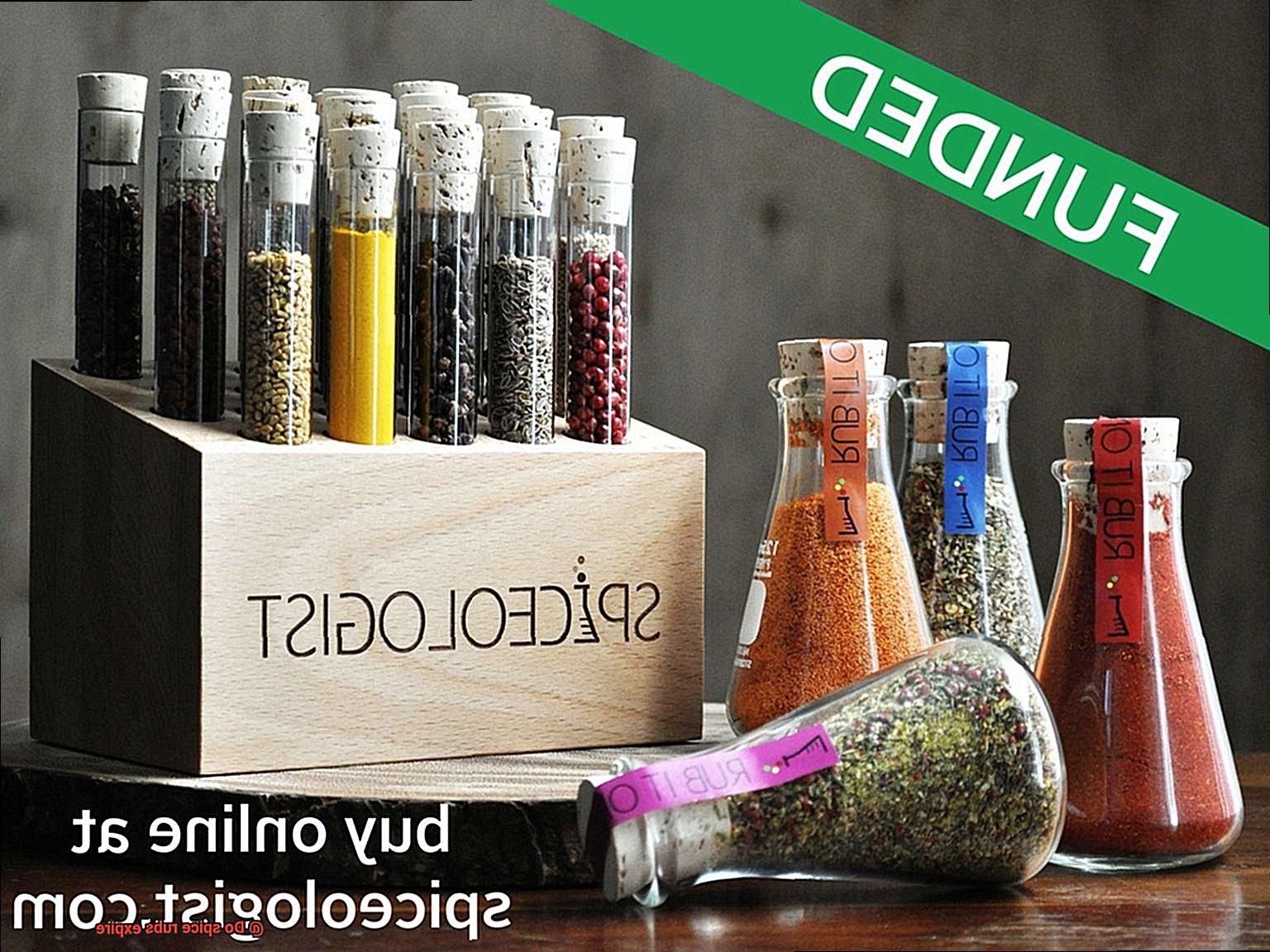
Sensory Test
Using your senses is an excellent way to check if your spice rub has gone bad. Smell the container first; if it smells stale or off, it’s past its prime. Then, perform a taste test by mixing a small amount of spice rub with oil and rubbing it onto a small piece of meat. If the flavors are weak or muted, the spice rub may have lost its potency.
Signs of Spoilage
It’s essential to look for any signs of spoilage on the surface of the spice rub such as discoloration or mold growth. These signs indicate that the spice rub has gone bad and should be discarded immediately. Using it could potentially lead to food poisoning.
Conclusion
In summary, spice rubs are an excellent way to elevate your cooking game with a burst of flavor. However, like all good things, they too have an expiration date. The quality of ingredients, storage conditions, and the type of spices used all impact the shelf life of a spice rub.
To ensure freshness and potency, use freshly ground spices or make your own blend using fresh ingredients. Proper storage is key as well – store your spice rubs in airtight containers away from heat and sunlight in a cool, dry place. Some commercial blends may contain preservatives that prolong their shelf life.
Remember that spices lose their intensity over time, so it’s crucial to use fresh ones for maximum flavor. Always check the expiration date on the container label before using any spice rub. If there’s no label available, rely on your senses by smelling and tasting the mixture for any signs of spoilage.
With these tips at hand, you can confidently experiment with various spices and create unique combinations for your next culinary adventure.

